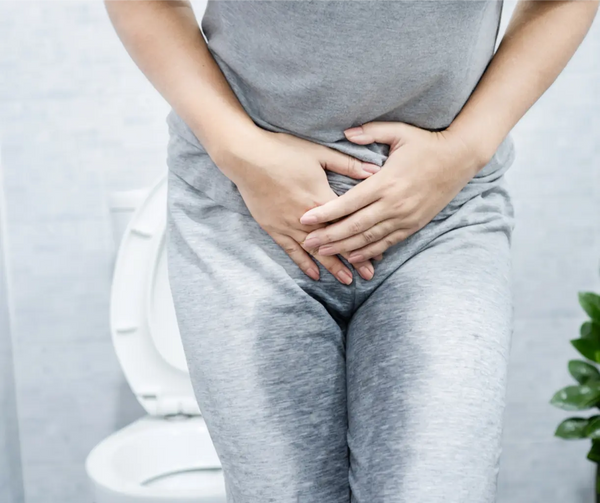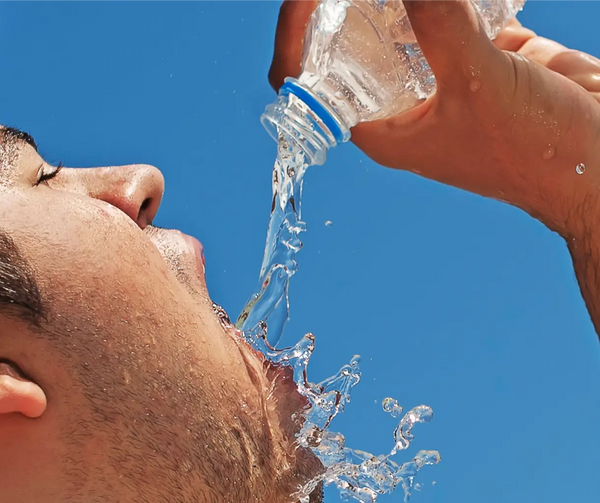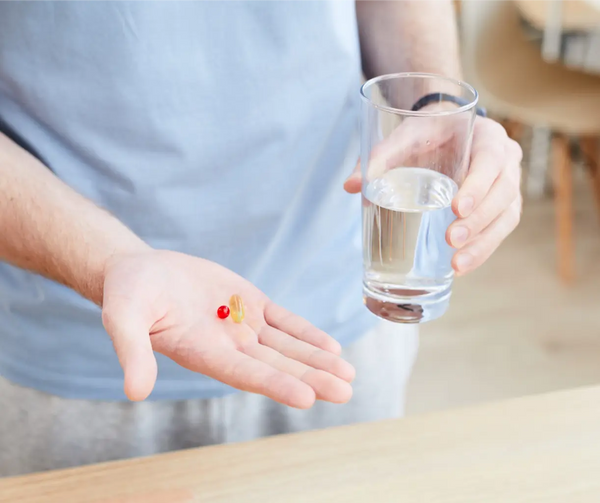-
Staying well-hydrated with a balanced fluid intake is key to improving urinary flow and reducing bladder irritation.
-
A bladder-friendly diet, avoiding caffeine and alcohol, supports better urinary health and reduces symptoms of urgency and frequency.
-
Regular physical activity and pelvic floor exercises can strengthen bladder muscles, supporting improved urinary flow.
-
Quitting smoking and managing fluid intake in the evening can alleviate common urinary symptoms and contribute to overall bladder health.
-
Consulting a healthcare professional is essential for diagnosing underlying causes of urinary flow issues and exploring appropriate treatment options.
Urinary flow problems are a common concern that can significantly affect an individual's quality of life, particularly among older men.
These issues range from the inconvenient, like the need to urinate frequently, to the serious, including urinary retention and infection.

At the heart of many of these problems is the prostate gland. Conditions such as benign prostatic hyperplasia (BPH) or enlarged prostate gland can lead to a diminished urine stream, leaking urine, and a frequent or urgent need to urinate.1
This article aims to explore practical strategies for improving urinary flow and preventing bladder issues, ensuring individuals can lead more comfortable and worry-free lives.
Urinary Flow
Urinary flow refers to the process of urine moving from the bladder and exiting the body through the urethra.
The bladder muscles contract to push urine out, while the sphincter muscles around the urethra relax to let urine pass.
For various reasons, this flow can become disrupted, leading to a weak urine stream, difficulty starting urination, or the sensation that the bladder is not fully emptying.
Causes of Urinary Flow Problems
Several conditions and factors can impair normal urinary flow:2
-
Benign Prostatic Hyperplasia (BPH): An enlarged prostate gland can constrict or block the urethra, hindering urine flow.1
-
Prostate Cancer: Though less common than BPH, prostate cancer can similarly affect urine flow by enlarging the prostate gland.
-
Urinary Tract Infections (UTIs): Infections can cause swelling and irritation of the urinary tract, affecting urine flow.
-
Neurological Disorders: Conditions affecting the nervous system, such as multiple sclerosis or spinal cord injuries, can disrupt the signals that coordinate urination.
-
Other Factors: Weak bladder muscles, bladder stones, and certain medications can also contribute to urinary flow problems.3

1. Hydrate Wisely
One key to managing urinary flow issues is to hydrate wisely. Both overhydration and dehydration can exacerbate urinary problems:4
-
Overhydration: Consuming too much fluid can overwhelm the bladder, leading to frequent urination and, in some cases, leaking urine. It's important to balance fluid intake to avoid putting unnecessary pressure on the bladder.
-
Dehydration: Insufficient fluid intake can lead to concentrated urine, which may irritate the bladder and urinary tract, worsening symptoms like the urgent need to urinate or urinary hesitancy.
-
Optimal Hydration: Aim to drink fluids evenly throughout the day and adjust based on your activity level and the weather. Limit intake of diuretics like caffeine and alcohol, which can increase urine production and irritate the bladder.
Proper hydration supports not only the health of the urinary tract but also the entire body, making it a fundamental step in improving urinary flow and avoiding bladder issues.
2. Opt for a Bladder-Friendly Diet
Diet significantly impacts urinary flow and bladder health. Certain foods and beverages can irritate the bladder, worsening urinary symptoms. To support urinary health:4
-
Limit irritants: Reduce intake of caffeine, alcohol, spicy foods, and acidic fruits, which can irritate the bladder and prostate.
-
Increase antioxidants: Foods rich in antioxidants, such as berries, nuts, and green leafy vegetables, can help reduce inflammation in the urinary tract.
-
Focus on fiber: A diet high in fiber helps prevent constipation, which can put pressure on the bladder and aggravate urinary symptoms.

3. Incorporate Regular Physical Activity
Regular exercise is crucial for maintaining a healthy weight, which can reduce pressure on the bladder and improve urinary symptoms.5
Physical activity also boosts overall health, which indirectly benefits the urinary tract. Aim for at least 30 minutes of moderate exercise most days of the week.
Activities like walking, swimming, and cycling are particularly beneficial without putting excessive strain on the pelvic floor.
4. Practice Pelvic Floor Exercises
Pelvic floor exercises, or Kegels, strengthen the muscles that support the bladder, urethra, and prostate. Stronger pelvic floor muscles can help improve bladder control and urine flow.6 To perform Kegel exercises:
-
Identify the right muscles: These are the muscles you use to stop urination midstream.
-
Contract and hold: Contract these muscles for three seconds, then relax for three seconds.
-
Repeat: Aim for three sets of ten repetitions daily.

5. Quit Smoking
Smoking can worsen urinary problems by increasing the risk of bladder cancer and contributing to bladder irritation.
Nicotine also affects the bladder muscles, potentially leading to incontinence and other urinary symptoms.7
Quitting smoking improves overall health and can significantly reduce urinary problems.
6. Manage Fluid Intake Before Bed
Limiting fluid intake in the hours before bedtime can help reduce the likelihood of nocturia—waking up during the night to urinate.4
While it's important to stay hydrated, try to consume most of your daily fluid intake earlier in the day and reduce drinks in the evening, especially those that can irritate the bladder, like caffeine and alcohol.

7. Explore Natural Supplements
Natural supplements can offer support in managing urinary flow issues, especially for those with benign prostatic hyperplasia (BPH).
Supplements such as saw palmetto, beta-sitosterol, and pygeum have been studied for their potential to improve urinary symptoms by targeting prostate health and reducing inflammation.8
However, it's crucial to approach supplements with caution:
-
Consult healthcare professionals before starting any new supplement to ensure it doesn't interact with existing medications or conditions.
-
Research-backed supplements: Look for supplements that have scientific studies supporting their use for urinary health.
-
Quality matters: Choose high-quality products from reputable manufacturers to avoid contaminants and ensure potency.
8. Embrace Warm Baths
Warm baths can be surprisingly effective for relieving discomfort associated with urinary flow problems. The warmth helps to relax the pelvic floor muscles, reducing the sensation of urgency and easing any pain associated with urination.
For individuals with BPH or other conditions causing painful urination, a warm bath can provide significant relief. Consider a daily soak, especially before bedtime, to ease symptoms and improve urinary flow.
9. Schedule Regular Bathroom Breaks
Training your bladder can help manage urinary urgency and frequency. Rather than waiting for the urge to urinate, schedule regular bathroom breaks throughout the day, every two to three hours. This proactive approach can help:
-
Reduce bladder pressure by preventing overfilling.
-
Improve bladder control by minimizing instances of urgent need.
-
Strengthen bladder muscles over time, supporting better overall urinary function.

10. Consult With a Healthcare Professional
When it comes to managing urinary flow issues, consulting with a healthcare professional is invaluable. They can provide:
-
Accurate diagnosis: Through physical examination, medical history, and possibly diagnostic tests to identify the underlying cause of urinary problems.
-
Personalized treatment plans: Tailored to your specific condition, whether it's medication, lifestyle adjustments, or possibly surgery for more severe cases.
-
Ongoing support and monitoring: To adjust treatment as needed and address any new symptoms or concerns.
Professionals may suggest various treatment options, including medications like alpha blockers to relax bladder neck muscles or surgical interventions for more severe cases.
When to See a Doctor
Identifying the right time to consult a healthcare professional is crucial in managing urinary flow problems effectively. Immediate medical attention should be sought if you experience any of the following symptoms:
-
Blood in the urine: This can indicate a more serious underlying condition, such as urinary tract infections, kidney stones, or more rarely, cancer.
-
Severe or sudden pain: Any acute discomfort in the lower abdomen, pelvis, or lower back can signal a serious issue requiring prompt evaluation.
-
Difficulty urinating or complete inability to urinate: Known as acute urinary retention, this is a medical emergency that needs immediate attention.
-
Significant changes in urinary habits: A drastic increase in frequency or urgency, especially if accompanied by fever or back pain, could suggest an infection.
If you notice a gradual worsening of symptoms like weak urine stream, frequent nocturia, or a feeling that the bladder is not fully emptying despite making lifestyle changes, it's time to see a doctor.
These symptoms could indicate an enlarged prostate or other conditions that might require medical intervention.
Conclusion
Managing urinary flow issues is a multifaceted approach that encompasses lifestyle adjustments, dietary changes, physical activity, and in some cases, natural supplements or medical treatment.
Simple practices like staying hydrated, adopting a bladder-friendly diet, and regular exercise can significantly improve symptoms. Additionally, pelvic floor exercises, quitting smoking, and managing fluid intake are proactive steps toward enhancing urinary health.
Warm baths and scheduled bathroom breaks can provide relief and help manage urgency, while natural supplements may offer additional support under a healthcare professional's guidance.
However, recognizing when to seek medical advice is crucial for addressing underlying causes and receiving appropriate treatment.
By understanding the strategies to improve urinary flow and knowing when to consult with healthcare professionals, individuals can effectively navigate urinary health challenges and improve their quality of life.
Frequently Asked Questions: How to Improve Urinary Flow
How can I improve my urinary flow naturally?
Improve urinary flow by staying hydrated, maintaining a bladder-friendly diet, exercising regularly, practicing pelvic floor exercises, and managing fluid intake before bed.
What are the signs I should see a doctor for urinary flow problems?
See a doctor if you experience blood in the urine, severe pain, difficulty urinating, significant changes in urinary habits, or persistent symptoms despite lifestyle changes.
Can dietary changes affect urinary flow?
Yes, adopting a bladder-friendly diet that avoids irritants like caffeine and alcohol can significantly improve urinary flow and reduce symptoms.
Are there exercises that help with urinary flow issues?
Pelvic floor exercises, such as Kegels, strengthen the muscles supporting the bladder and can improve urinary flow and reduce leakage.
What natural supplements are recommended for improving urinary flow?
Natural supplements like saw palmetto and beta-sitosterol may support better urinary flow, especially in cases of benign prostatic hyperplasia (BPH), but consult a healthcare professional before use.
References:
-
Roehrborn CG. Benign prostatic hyperplasia: an overview. Rev Urol. 2005;7 Suppl 9(Suppl 9):S3-S14. PMID: 16985902; PMCID: PMC1477638.
-
Dougherty JM, Aeddula NR. Male Urinary Retention. [Updated 2022 Aug 10]. In: StatPearls [Internet]. Treasure Island (FL): StatPearls Publishing; 2024 Jan-. Available from: https://www.ncbi.nlm.nih.gov/books/NBK538499/
-
Flores JL, Cortes GA, Leslie SW. Physiology, Urination. [Updated 2023 Sep 13]. In: StatPearls [Internet]. Treasure Island (FL): StatPearls Publishing; 2024 Jan-. Available from: https://www.ncbi.nlm.nih.gov/books/NBK562181/
-
Hahn RG. Effects of diet, habitual water intake and increased hydration on body fluid volumes and urinary analysis of renal fluid retention in healthy volunteers. Eur J Nutr. 2021 Mar;60(2):691-702. doi: 10.1007/s00394-020-02275-4. Epub 2020 May 19. PMID: 32430554; PMCID: PMC7900032.
-
National Guideline Alliance (UK). Physical activity for the management of symptoms: Pelvic floor dysfunction: prevention and non-surgical management: Evidence review L. London: National Institute for Health and Care Excellence (NICE); 2021 Dec. (NICE Guideline, No. 210.) Available from: https://www.ncbi.nlm.nih.gov/books/NBK579543/
-
Huang YC, Chang KV. Kegel Exercises. [Updated 2023 May 1]. In: StatPearls [Internet]. Treasure Island (FL): StatPearls Publishing; 2024 Jan-. Available from: https://www.ncbi.nlm.nih.gov/books/NBK555898/
-
Mobley D, Baum N. Smoking: Its Impact on Urologic Health. Rev Urol. 2015;17(4):220-5. PMID: 26839519; PMCID: PMC4735668.
- Fagelman E, Lowe FC. Saw Palmetto Berry as a Treatment for BPH. Rev Urol. 2001 Summer;3(3):134-8. PMID: 16985705; PMCID: PMC1476047.
